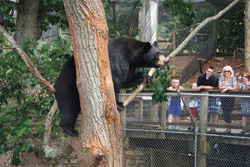Whether you're an Asheville developer, a homeowner or a corpse that's ready to be buried in Riverside Cemetery, the cost of living (and dying) in Asheville is going up.

The new fiscal year began July 1. After initially facing a projected $5 million budget shortfall, Asheville City Council ultimately approved a spending plan that holds the line on property taxes while maintaining core services. How did they do it? In general, the strategy was to cut some city positions, postpone spending on capital projects, freeze city workers' salaries, slash overtime spending and raise fees.
The latter point is where the taxpaying public will probably feel the new budget's impact the most. And though most increases are small, they do add up. Here's a quick rundown on some key changes:
• The residential recycling charge has jumped from $1.32 to $2.95 per month. The charge for a trash container picked up by one of the city's trucks equipped with an automated arm is now $3.80 per container per month (up from $3.50).
• All water customers will see their bills increase. The residential charge has risen from $3.45 to $3.59 per 100 cubic feet of water used. Meanwhile, the fee to establish or transfer an account has gone from $25 to $55.
• The cost of a 30-day play pass for city residents at the Municipal Golf Course has jumped from $400 to $500.
• If you want to be buried at Riverside Cemetery, an adult grave space for a city resident now costs $1,300 (up from $1,100). The interment fee for an adult has gone from $1,100 to $1,200 (on weekdays before 4:30 p.m.).
• City park users will pay more for everything from playing tennis at Aston Park to renting a swimming pool. At the WNC Nature Center, the cost of attending the annual Wolf Howl has doubled, from $5 to $10.
• Asheville Civic Center fees have also increased. It now costs more to rent both the arena and Thomas Wolfe Auditorium, two popular venues in town, and the associated costs for staff have also gone up. The services of door guards, ticket takers and ushers that formerly cost users $9 an hour will now cost $11.
• Tap and connection fees are also increasing. On a positive note, water-conservation kits (which previously cost either $3.75 or $4.50) are now free.
• Developers' wallets are getting hit as well. Changing street names, which used to be free, will now cost $100 for those affecting up to five addresses, and more as the number of addresses increases. And a grading permit that used to cost $540 is now a cool $620.
To view the entire list of fee changes, go to www.mountainx.com/xpressfiles.



Before you comment
The comments section is here to provide a platform for civil dialogue on the issues we face together as a local community. Xpress is committed to offering this platform for all voices, but when the tone of the discussion gets nasty or strays off topic, we believe many people choose not to participate. Xpress editors are determined to moderate comments to ensure a constructive interchange is maintained. All comments judged not to be in keeping with the spirit of civil discourse will be removed and repeat violators will be banned. See here for our terms of service. Thank you for being part of this effort to promote respectful discussion.